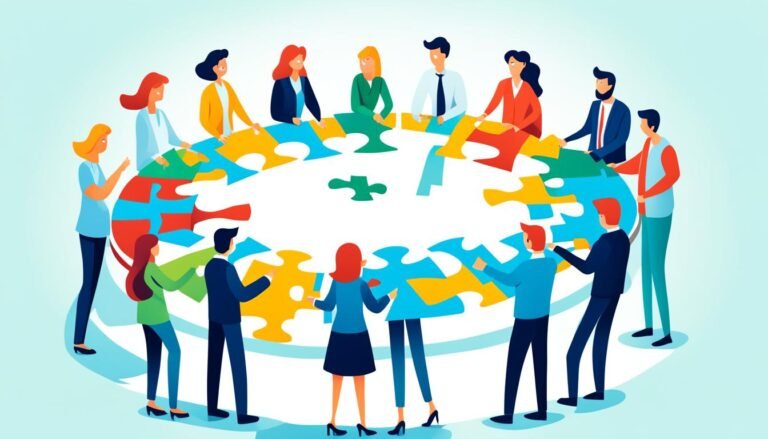Conflict Resolution as a Soft Skill
Master conflict resolution as a soft skill for effective interpersonal relationships and a positive environment. It is essential for personal and professional success. Enhance communication, collaboration, and job satisfaction by honing conflict resolution abilities. By mastering this skill, you become an asset in any organization. Start by developing self-awareness, empathy, and social skills. Conquer conflict constructively to advance your career and strengthen connections with others. An investment in conflict resolution skills yields fruitful outcomes for all involved. Explore further for strategies and techniques to navigate conflicts seamlessly.
Key Takeaways
- Conflict resolution as a soft skill enhances communication and collaboration.
- It fosters positive work environments and productive relationships.
- Developing empathy and social skills is crucial for effective conflict resolution.
- Self-awareness and self-regulation aid in managing conflicts constructively.
- Training in conflict resolution equips individuals with essential tools for resolving conflicts peacefully.
Importance of Conflict Resolution
Conflict resolution plays an essential role in fostering productive relationships and maintaining a harmonious work environment. In both workplace dynamics and family dynamics, conflicts are inevitable due to differing opinions, personalities, and goals. How you handle these conflicts can have a substantial impact on the atmosphere and efficiency within these settings.
Within workplace dynamics, conflicts can arise from misunderstandings, competition, or differences in work styles. By developing strong conflict resolution skills, you can address these issues effectively, leading to improved teamwork, communication, and overall job satisfaction. Resolving conflicts in the workplace in a constructive manner can also prevent small issues from escalating into larger problems that disrupt productivity and morale.
Similarly, in family dynamics, conflicts may stem from various sources such as miscommunication, financial stress, or differing values. Learning to navigate these conflicts with empathy, active listening, and compromise can strengthen family bonds and create a more supportive and understanding environment. Conflict resolution skills are essential in both professional and personal relationships, contributing to healthier interactions and more positive outcomes.
Benefits in Personal Relationships
When you practice conflict resolution skills, you can build trust with those in your personal relationships.
By improving your communication skills, you create a stronger bond with others.
These benefits can lead to healthier and more fulfilling relationships overall.
Building Trust Through Conflict Resolution
By approaching disagreements with empathy and open communication, you can strengthen the foundation of trust in your personal relationships. Trust building is essential for healthy interactions, and conflict management plays a pivotal role in this process.
When conflicts arise, it's important to address them promptly and constructively. Listening actively to the other person's perspective and expressing your own feelings calmly can help bridge the gap and foster understanding. Avoiding blame and focusing on finding solutions together can enhance trust and deepen the bond between you.
Improving Communication Skills
To enhance your personal relationships, developing strong communication skills is key for fostering understanding and trust.
Active listening plays a vital role in effective communication. By actively listening to your partner or loved ones, you show that you value their thoughts and feelings, which can deepen your connection.
Additionally, assertiveness training can help you express your needs and boundaries in a clear and respectful manner. Being assertive allows you to communicate honestly without being aggressive or passive. Practice using 'I' statements to convey your emotions and desires constructively.
Improving your communication skills through active listening and assertiveness training can lead to healthier and more fulfilling relationships built on mutual respect and understanding.
Strengthening Bond Within Relationships
Strengthen the bond within your personal relationships by actively engaging in activities that promote understanding and connection. To enhance your relationships, focus on the following:
- Relationship Building: Invest time in getting to know the other person on a deeper level. Share experiences, thoughts, and feelings to create a stronger connection.
- Trust Strengthening: Be honest, reliable, and consistent in your actions. Trust forms the foundation of any healthy relationship and must be nurtured over time.
- Conflict Management: Learn to address conflicts in a constructive manner. Listen actively, communicate openly, and work together to find solutions. Managing conflicts effectively can lead to a deeper bond with your loved ones.
Benefits in Professional Settings
Conflict resolution skills offer substantial advantages within professional environments, fostering effective communication and collaboration among team members. In professional settings, the ability to navigate and resolve conflicts efficiently contributes greatly to workplace harmony. By addressing and resolving issues promptly, you create a positive work environment that enhances productivity and job satisfaction for all team members.
Moreover, mastering conflict resolution can be a catalyst for career advancement. Employers highly value individuals who can manage conflicts diplomatically and constructively. Your proficiency in this soft skill demonstrates your capability to handle challenging situations with grace and professionalism, setting you apart as a valuable asset within the organization. As you showcase your adeptness at resolving conflicts, you build a reputation as a reliable team player who can navigate complex interpersonal dynamics with finesse.
This positive recognition can lead to increased opportunities for growth and advancement in your career. Embracing conflict resolution skills not only benefits your professional relationships but also propels your career trajectory towards success.
Communication Skills and Conflict Resolution
Enhance your ability to address and resolve conflicts effectively by honing your communication skills. When it comes to conflict resolution, effective communication is key. Here are three essential communication skills that can help you navigate conflicts successfully:
- Active Listening: Actively listening to the other party involved in the conflict shows that you value their perspective. It involves giving your full attention, showing empathy, and clarifying information to assure understanding.
- Interpreting Nonverbal Cues: Pay attention to nonverbal cues such as body language, facial expressions, and tone of voice. These cues can provide valuable insights into the emotions and feelings of the other person, helping you respond appropriately.
- Expressing Clearly and Respectfully: Clearly expressing your thoughts and emotions while maintaining a respectful tone is vital in conflict resolution. Be concise, specific, and avoid making assumptions to prevent misunderstandings.
Strategies for Conflict Resolution
Utilize proactive approaches to effectively manage and resolve conflicts in various settings. Vital listening plays a pivotal role in conflict resolution. By truly listening to the other party's perspective and feelings, you can demonstrate empathy and gain a better understanding of the root causes of the conflict. This paves the way for productive discussions and solutions.
Compromise is another key strategy in conflict resolution. It involves finding a middle ground where both parties can agree and feel satisfied with the outcome. Through compromise, you show a willingness to collaborate and prioritize finding a resolution over being solely focused on your own interests.
Mediation and negotiation are formal conflict resolution techniques that can be utilized when conflicts escalate or become too complex to handle independently. A neutral third party can facilitate discussions, help parties communicate effectively, and guide them towards finding a mutually acceptable solution. Negotiation involves give-and-take discussions aimed at reaching a compromise that benefits all involved parties. By integrating these strategies into your conflict resolution approach, you can navigate conflicts effectively and foster positive outcomes.
Emotional Intelligence and Conflict Resolution
To navigate conflicts effectively and foster positive outcomes, understanding and managing emotions play an essential role in conflict resolution. Emotional intelligence, encompassing self-awareness, empathy, social skills, and self-regulation, is critical in handling conflicts with finesse. Here are three key points to keep in mind:
- Self-awareness: Recognizing your own emotions, triggers, and biases is the first step in effectively managing conflicts. Understanding how you feel and why you feel that way can help you respond more thoughtfully in challenging situations.
- Empathy: Putting yourself in the other person's shoes and understanding their perspective is crucial for resolving conflicts peacefully. Empathy allows you to acknowledge the emotions and concerns of others, fostering better communication and mutual understanding.
- Social Skills and Self-regulation: Developing strong social skills enables you to communicate effectively, build rapport, and negotiate solutions collaboratively. Additionally, practicing self-regulation helps you control impulsive reactions and respond to conflicts in a composed and constructive manner.
Conflict Resolution Training and Development
Conflict resolution training programs offer practical strategies and tools for effectively managing and resolving conflicts in various settings. These programs are designed to equip individuals with the necessary skills to navigate and address conflicts constructively. By participating in conflict resolution workshops, you can learn a variety of conflict resolution techniques that can be applied in professional and personal contexts.
Workshops typically focus on enhancing communication skills, active listening, empathy, and problem-solving abilities. Participants engage in role-playing scenarios, case studies, and group discussions to practice implementing these techniques in realistic conflict situations. Through interactive activities, individuals can develop a deeper understanding of conflict dynamics and learn how to de-escalate tense situations effectively.
Conflict resolution training and development not only improve your ability to manage conflicts proactively but also foster a more positive and collaborative work environment. By investing in honing your conflict resolution skills, you can contribute to building stronger relationships and achieving mutually beneficial outcomes in diverse situations.
Conclusion
Conflict resolution is an essential soft skill that can greatly benefit both personal and professional relationships. By developing strong communication skills, understanding emotional intelligence, and implementing effective conflict resolution strategies, you can navigate conflicts with ease.
Did you know that according to a study by the American Management Association, 85% of employees report experiencing workplace conflict at some point in their careers? Investing in conflict resolution training and development can lead to a more harmonious and productive work environment.








